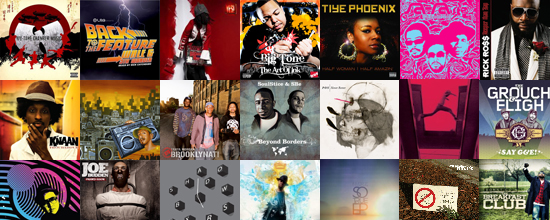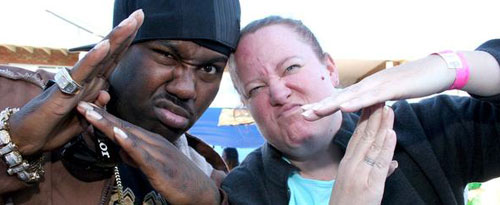Hip Hop 2009: Year of the Glut
Posted by Justin Boland on Jul 12, 2009 | 0 Comments
“You really can’t call it underground anymore; whatever that means now. When your biggest artist like a Soulja Boy is selling 40,000 in the first week, what’s underground? It’s kind of hard to put somebody in that box and I’m glad that box is going away.”
—9th Wonder from AllHipHop

Dropping an Album in 2009
You’ve poured months (years) of sweat into your songs, you’ve done hundreds of takes, you’ve spent weeks mixing it. You’ve gotten the album mastered, you’ve traded drugs + sneakers for badass cover art, you’ve saved up the money to get the CD manufactured. You’ve digitized your tracks, you’ve fixed up all your metadata, and you’ve submitted your album to itunes, Amazon, Emusic and more.
I’m going to tell you something most music biz blogs never will: you are completely fucked. You’re making hip hop, one of the most over-saturated genres of music on the planet in 2009. Your first official release is not a major landmark in anyone else’s life-it’s not even a blip on the radar screen. Although it’s true you’re “progressing” with an official release, it’s even more true that you’re just barely getting started with the hardest part.
The Big Picture

Here it is, in one paragraph:
Hip Hop, as a money-making album sales genre, peaked in the year 2000. That’s the year of Chronic 2001, Marshall Mathers, and Nelly’s Country Grammar. That’s the year that rap sales jumped over 20% and hit the all-time high water mark of 105.5 million units sold. Ever since then, those numbers have been nose-diving towards our current recession, which sees the trend reversed: in 2008, rap sales dropped 19.8%, hovering at over 33 million units.
Back in 2007, it got very fashionable to start talking about The End of Rap: Time, Newsweek, Fox News and the New York Times all got into the mix. (Then, of course, Fox News had to return and ask the burning question: IS HIP HOP GOING OUT OF STYLE?)
The Information Age is also a culture of amnesia: none of this was news, or even new. Entertainment Weekly was running the same conversation about 2001 album sales, and besides, the entire popular media conversation is basically reporters using Soundscan numbers and interviewing artists who know even less.
This is not all bad news, though. Looking outside the sales numbers, a different picture emerges. Digital downloads are increasing every year, the global market is growing daily and they prefer hip hop to rock, and online radio use jumped 33% in 2008. Especially good news for you and me: 2008 was the year that vinyl made a big-money comeback, moving a record 1.8 million units. And despite shrinking sales, the music business remains a $6 billion dollar economy. (If you really want money, though, you should be focused on passing bar exams and learning the commodities market. Those are much, much bigger economies.)
Just to keep those hopeful numbers in perspective…online radio has seen big growth but it’s still not a major competitor for your local FM station. That 33% jump in listeners adds up to 69 million listeners, but regular radio has 235 million. (In a country with 306 million humans total, that’s a pretty important demographic.) For digital downloads, the big picture is even worse. In 2007, there were 13 million songs available for sale online. 3 million of those sold. To put it mathematically, that means 77% of all the digital downloads in 2007 sold exactly zero copies.
When you’ve made an album, your odds are even worse:
According to SoundScan, 105,000 new full-length albums were released in 2008, up almost 300% from earlier in the decade. The number that sold over 1000 units in the first year? Only 6,000.
In other words, you’re competing with more people for less money, every year. Welcome to 2009.

“So Wait…I’m Just Fucked?”
Did you really think I’d just drop that on you without even mentioning some solutions?
1. More Planning, Less Marketing. Don’t focus on how many people you reach. Focus on making sure that when people want to find out about you, you’ve made it easy and interesting for them, every step of the way. Make sure they’ve got a means to contact you directly, and make sure they can spend money on your music if they want. Believe me-this sounds simple but it’s anything but. The amount of planning and work that goes into designing a profitable online business is absurd. (Rest assured, I am taking notes every step of the way, and I’ll be laying out the mistakes we’ve made so that you don’t have to repeat them.)
2. Organize Your Catalog At World Around, I’m lucky to have two artists who are basically willing test animals: DJ Multiple Sex Partners and Adam Kadmon. Both of them are only interested in making music-they want no part of branding, marketing, promotion, or even organizing their tracks. This gives me the opportunity to play producer even to the extent of making their albums, and I’ve modeled their catalogs on a proven success: internet marketing templates. We’ve created a free front end, which brings people into a deeper “back end” catalog of multiple albums and EP’s, all with different price levels.
When I explain this to artists, they get frustrated…and they should. It doesn’t mean they’re immature or something: it really does suck. Your first album is only the first step towards being profitable. You need to release multiple projects before you start seeing sustainable money from your music. I know this from my own career, but I’m also kind of a dipshit, so check out Terry McBride of Nettwerk:

We’ve found in the digital space, that you will sell anywhere between 25% to 50% of your volume from your catalog upon release of any new albums. So you are layering intellectual property. In the digital space, where you don’t need to buy shelf space, if you create the right metadata behind what you’re doing, and market it in an effective way-you’re not marketing the new album, you’re marketing the brand. By the time you make it to album three, you are selling as much of the catalog as the new album, but you don’t have the cost with the catalog and everything starts to make sense.
3. Minimize the Bullshit. If I signed a new artist to World Around Records right now, I would immediately gut their myspace and pack it full of links to Bandcamp. I would skip the Facebook page, because I don’t think that really becomes useful until your fanbase is in the 4 figure range and you’re actively playing shows. I would make Bandcamp the central destination, and use it to push an EP. We would make that EP available for “free” in exchange for an email address, and we’d also offer a paid download with multiple bonus tracks, generally in the $3 to $5 dollar range. Bandcamp is easy to set up, customizable, and best of all they will dump payment money directly into the artists’ Paypal account, with zero calculation or effort on my part.
Let’s be honest: this social networking is mostly boring bullshit, and we need to minimize the time we spend on it. Everyone will always be hyping new services and sites, but very few of them are truly useful enough to justify using them. For instance, unless the artist was online every day and comfortable using it, I’d never set them up a Twitter account. It’s better to have empty channels than to do a half-assed job on several dozen channels.

The Last Word: Wendy Day
Wendy Day is the truth. There is nobody in this business I would recommend listening to more. She has seen everything, and if you’re reading Audible Hype but don’t know who she is…get familiar ASAP. Start here:
Source: The Day Report
“Imagine if you will, that there are over 50,000 people who want to be rappers, 100,000 people who want to be producers, and another 25,000 who want to be singers. Half of them have enough talent to get past the first year. Of those remaining, 25% have the work ethic to continue past the second year struggling to get on. Of those remaining, 1% have the charisma to be a star, and half of those are willing to do whatever it takes to win-that’s called passion.
Let’s say you are in that Top Half of 1%…here’s what you are competing with:
Of the 4 major labels (Universal, WEA, Sony/BMG, Capitol-and is Virgin even doing anything in urban music anymore?) and the additional 4 or 5 “incubators and indies” that are really doing anything worthwhile, they can only distribute MAYBE 40 to 60 acts a year, and that includes artists who are already signed. Signed artists who’ve already sold a lot of CDs will always be the priority projects because they’re proven entities-the risk is reduced. This is a business, after all.
Of those 40 or 60 acts, if you are a new producer trying to get into the music business, that’s only 400 to 800 songs. I have over 5,000 producers in my data base. There’s just not that much work out here! You’re really gonna have to stand out.
My point isn’t to depress you or to try and stop you from wanting to live your dream. My point is the opposite! To win, you have to stand out from everyone else. You have to work harder, be smarter, have better knowledge, better connections, access to people who can and want to help you, have a better team, and maybe, just maybe, even have a little more talent than everyone else. And you damn well better have the charisma to be a star. And you better continue to work harder than everyone else because the day that you stop grinding, along comes someone else a little hungrier to take your place.”
